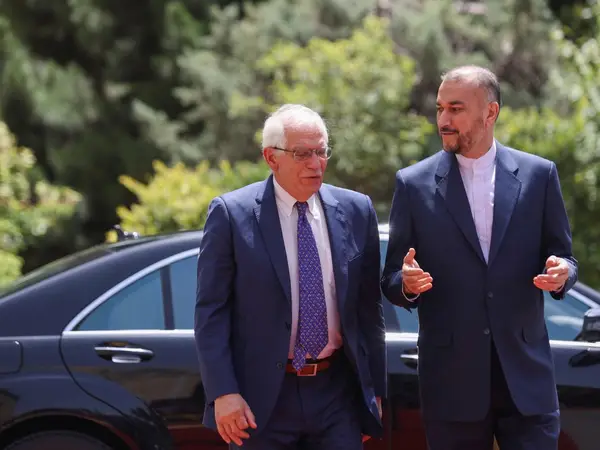Accounts differed Saturday on whether Joseph Borrell, the EU lead foreign policy official, had claimed tangible progress in reviving the 2015 Iran nuclear deal.
In a joint news conference in Tehran with Iranian Foreign Minister Hossein Amir-Abdollahian, Borrell, the European Union High Representative for Foreign Affairs and Security Policy, spoke of resuming negotiations “speedily.”
There was no clarification from either Borrell or Amir-Abdollahian, whose news conference followed a three-and-a-half hour meeting, as to what changes would break the impasse that in March paused year-long talks in Vienna.
Borrell – according to IRNA, Iran’s official news agency – said the talks had lapsed with outstanding questions “that Iran and the United States were supposed to answer,” but neither he nor Amir-Abdollahian gave any indication Saturday that Tehran or Washington had answered these questions.
One outstanding matter is reportedly the US designation of Iran’s Revolutionary Guards (IRGC) as a ‘foreign terrorist organization,’ which highlights wider disagreement between Washington and Tehran over which US sanctions violate the JCPOA.
“This [delay in the Vienna talks] was not supposed to be three months,” Borrell said, according to IRNA. “But today the talks should resume, and this is a decision to be made by Tehran and Washington.”
Different words from Borrell were cited by Reuters. "We are expected to resume talks in the coming days and break the impasse,” was the agency’s account. “I am very happy about the decision that has been made in Tehran and Washington.” These words have fed wider media reports of agreement to resume talks, including with the US.
According to IRNA, Borrell said that after his Tehran trip Tehran talks “will resume, and my team will be there.” Borrell was quoted in some media that these talks would not be in Vienna but in the Persian Gulf.
‘Possibility'
But IRNA also reported from New York a “State Department source” expressing “appreciation for the efforts of Joseph Borrell,” as Washington awaited “consultation with him about his talks in Tehran.” IRNA’s source referred to the “possibility of resuming indirect talks with Iran.”
The US and Iran have since March have placed the onus for reaching agreement firmly on the other and have traded accusations that the other had raised demands unrelated to the JCPOA. Amir-Abdollahian appeared to restate this Saturday in expressing “hope” that “the American side will this time realistically and fairly engage in committed and responsible acts towards reaching the final point of an agreement.”
The Iranian foreign minister called his meeting with Borrell “long but positive.” Amir-Abdollahian stressed the importance of links between Iran and the “European continent…especially in trade relations,” a remark suggesting the EU was floating trade incentives for Iran should there be agreement on reviving the 2015 deal, the Joint Comprehensive Plan of Action (JCPOA).
New incentives?
The three European JCPOA signatories – France, Germany, and the United Kingdom – condemned President Donald Trump in 2018 for withdrawing from the agreement and imposing ‘maximum pressure’ sanctions that threatened punitive action against third parties trading with Iran. But the EU’s financial mechanism designed to protect European-Iran trade, Instex, proved ineffective as European companies ended commercial links.
There have been recent suggestions of Europe offering Tehran new economic incentives, including in the energy sector, should the JCPOA be restored, potentially soothing Iranian fears over the impact of the US again leaving the agreement.
Borrell later met Ali Shamkhani, Secretary of Iran’s Supreme National Security Council (SNSC), who said the "Iran's retaliatory actions in the nuclear sector” were “merely legal and ratinal responses to US unilateralism and European inaction” and would “continue as long as the West's illegal practices are not changed." The EU announced Borrell’s visit Friday as a two-day trip.
